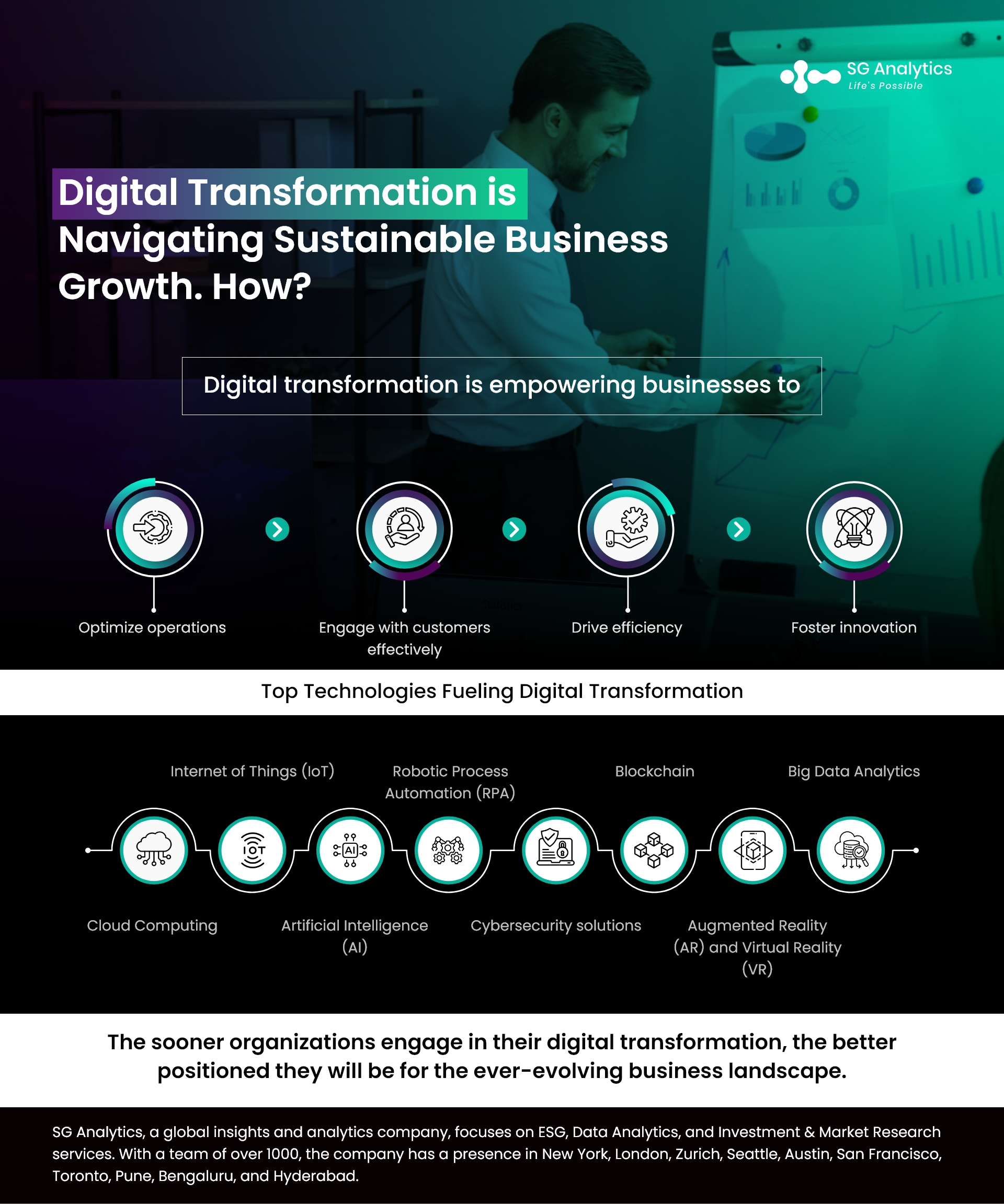In today’s fast-evolving digital marketplace, the key to business growth encircles accelerated innovation and greater agility. More and more organizations are strategically embracing the cloud to speed up innovation and achieve set goals.
Business growth stems from “hyper digitization,” which signifies that products and services are mostly digital. Many organizations are choosing digital as the right strategy to implement as it offers the fastest means to achieve growth. Digitization can quickly transform and diversify business offerings, enhance customer satisfaction, and generate greater competency.
Digital transformation is fundamentally altering the way organizations across all sectors operate. The transformation is bringing the benefits of greater efficiency, effective project management, heightened capacity for innovation and much more. However, harnessing the powers of new technology is not easy.
Read more: Data-Driven Decision-Making: The Key to Thriving in the Digital Age
Tapping into the Power of AI
The primary catalyst for digital transformation when becoming a digital enterprise is Artificial intelligence (AI). AI helps speed up the process of understanding current insights, consuming large amounts of information, and making recommendations that can speed up business operations. AI is changing the way the world does business.
Artificial intelligence is becoming one of the critical drivers of digital transformation. While data lies at the heart of this transformation, AI excels at automation and advanced data analytics. Due to its role in transforming business operations, it is essential for organizations to have access to high-quality data.
There are many ways AI is helping to drive digital transformation. The use of AI assists organizations with everything - from internal and external chatbots to helping management expedite the process and giving employees access to real-time guidance. Benefits also include increased efficiency and productivity, along with increased transparency and employee empowerment.
Modern AI and predictive analytics are presenting enterprises with the opportunity to automate and analyze data to generate better insights. Better data can help enhance the performance of decision-makers at all levels, making it easier to improve the data and find the perfect decision-maker. With better information–better information, organizational leaders can make more informed decisions.

Importance of Digital Transformation for Growth
Businesses operate in a volatile environment. They cope with numerous challenges like rapidly changing business scenarios, fluctuations in global economies, and unpredictable customer demands. There is also cut-throat competition in the market. Businesses need to navigate compliance and other regulations as well as keep track of all these fluctuations to achieve sustainable business growth.
Read more: Harnessing the Power of Data to Transform Business Models and Drive Growth
The concept of digital transformation is significantly reshaping traditional business models. Advancements in digital technologies like big data analytics, artificial intelligence, and the Internet of Things are revolutionizing critical aspects of business operations, such as customer engagement, operational efficiency, and revenue generation. Furthermore, digital transformation is impacting business model innovation, further emphasizing the need for organizations to adapt and evolve with the changing dynamics of market and consumer preferences.
Under these circumstances, enterprise transformation services are emerging as a beacon of hope for businesses to foster change and make businesses agile and resilient.
Top Technologies Fueling Digital Transformation
-
Cloud computing
The adoption of cloud computing is growing significantly. Cloud infrastructure supports big data analytics, artificial intelligence (AI), and machine learning (ML) models.
-
Internet of Things (IoT)
IoT sensors offer real-time data to operations across sectors. This data assists organizations in optimizing processes for better outcomes.
-
Artificial Intelligence (AI)
AI has emerged as a transformative force that is revolutionizing every industry and continuing to reshape operations. The worth of AI is expected to increase by 13x in the next seven years. This incorporates machine learning, Natural Language Processing (NLP), Generative AI, and more.
-
Robotic Process Automation (RPA)
RPA bots are taking over repetitive tasks across organizations to boost operational speed, reduce errors, and enhance efficiency.
-
Cybersecurity Solutions
The rise of technological innovation is giving rise to increased cyber risks. Due to this reason, businesses need to focus on cybersecurity solutions to protect their sensitive data.

-
Blockchain
Blockchain technology helps in managing the rising demand for security and transparency across digital systems. The industry is set to witness a more widespread adoption of blockchain and supply chains.
-
Augmented Reality (AR) and Virtual Reality (VR)
Today, customers demand more personalized experiences, and businesses across sectors are integrating AR and VR technologies to offer immersive experiences to customers. The AR and VR market is expected to double between 2024 and 2028.
-
Big Data Analytics
Data lies at the core of automation technologies. Big data analytics is set to grow significantly in 2024, with 5G powering quick data transfers.
Read more: Navigating the Future of Marketing with AI-Powered Solutions
Tackling Modernization and Digital Transformation
Digital transformation has fundamentally altered the way organizations across all sectors operate. Digital transformation has brought the benefits of greater efficiency, effective project management, and heightened capacity for innovation. However, it is vital to understand that digital transformation concerns productivity, resilience, and operational efficiency. But it also concerns sustainability.
Modernization and digital transformation are distinct, that can unlock growth and prevent revenue leakage. In this sense, new technologies are enabling organizations with precise emissions and resource consumption monitoring across processes. This is further leading to a faster adoption of circular business models, to reduce environmental footprint and maximize resource reusability across industries.

To drive business model innovation, organizations need to implement strategies and effectively integrate digital transformation initiatives into their existing business models. Strategic planning, organizational culture, and leadership commitment further help drive successful digital transformation initiatives. By gaining a deeper understanding of the role of digital transformation as a catalyst for business model innovation, organizations can navigate the complex landscape of digital disruption while capitalizing on emerging opportunities for organizational growth.
Read more: Data Revolution: Empowering Businesses for a Data-driven Future
Digital Transformation - The Way of the Future
Digital transformation empowers businesses to optimize their operations, engage with customers effectively, drive efficiency, and foster innovation. It not only helps ensure business growth in the short duration but also fosters long-term sustainability by effectively managing resource utilization, minimizing waste, and reducing environmental impact. As businesses traverse the growing digital landscape, they need to embrace digital transformation to thrive and lead in their respective industries.
Beyond unlocking speed and efficiency, when investing in digital transformation, organizations need to take into consideration long-term growth and prepare their business cases accordingly. Clearly defining the breakpoint will further help with operational efficiencies and incremental revenue.
Whatever the case, the sooner organizations engage in their digital transformation, the better positioned they will be for the ever-evolving business landscape.
A leader in Market research services, SG Analytics enables organizations to achieve actionable insights into products, technology, customers, competition, and the marketplace to make insight-driven decisions. Contact us today if you are an enterprise looking to make critical data-driven decisions to prompt accelerated growth and breakthrough performance.
About SG Analytics
SG Analytics (SGA) is an industry-leading global data solutions firm providing data-centric research and contextual analytics services to its clients, including Fortune 500 companies, across BFSI, Technology, Media & Entertainment, and Healthcare sectors. Established in 2007, SG Analytics is a Great Place to Work® (GPTW) certified company with a team of over 1200 employees and a presence across the U.S.A., the UK, Switzerland, Poland, and India.
Apart from being recognized by reputed firms such as Gartner, Everest Group, and ISG, SGA has been featured in the elite Deloitte Technology Fast 50 India 2023 and APAC 2024 High Growth Companies by the Financial Times & Statista.









